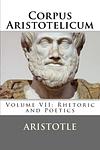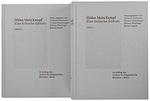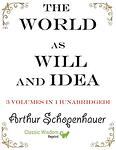The Greatest Greek, German "Nonfiction" Books of All Time
Click to learn how this list is calculated.
This list represents a comprehensive and trusted collection of the greatest books. Developed through a specialized algorithm, it brings together 300 'best of' book lists to form a definitive guide to the world's most acclaimed books. For those interested in how these books are chosen, additional details can be found on the rankings page.
Genres
Countries
Date Range
Reading Statistics
Click the button below to see how many of these books you've read!
Download
If you're interested in downloading this list as a CSV file for use in a spreadsheet application, you can easily do so by clicking the button below. Please note that to ensure a manageable file size and faster download, the CSV will include details for only the first 500 books.
Download-
1. The Republic by Plato
"The Republic" is a philosophical text that explores the concepts of justice, order, and character within the context of a just city-state and a just individual. It presents the idea of a utopian society ruled by philosopher-kings, who are the most wise and just. The dialogue also delves into theories of education, the nature of reality, and the role of the philosopher in society. It is a fundamental work in Western philosophy and political theory.
-
2. Communist Manifesto by Karl Marx, Friedrich Engels
This influential political pamphlet advocates for the abolition of private property, the rights of the proletariat, and the eventual establishment of a classless society. The authors argue that all of history is a record of class struggle, culminating in the conflict between the bourgeoisie, who control the means of production, and the proletariat, who provide the labor. They predict that this struggle will result in a revolution, leading to a society where property and wealth are communally controlled.
-
3. Thus Spake Zarathustra by Friedrich Nietzsche
This philosophical novel explores the idea of the Übermensch, or "Overman," a superior human being who has achieved self-mastery and created personal meaning in life. The protagonist, Zarathustra, descends from his solitary life in the mountains to share his wisdom with humanity. Through a series of speeches and encounters, he challenges traditional beliefs about good, evil, truth, and religion, and advocates for the transcendence of man into a higher form of existence. The book is noted for its critique of morality, its poetic and often cryptic language, and its exploration of complex philosophical concepts.
-
4. The Histories of Herodotus by Herodotus
"The Histories of Herodotus" is an ancient text that provides a comprehensive account of the Greco-Persian Wars. It is often considered the first work of history in Western literature. The author, often referred to as the 'Father of History', provides a narrative that not only discusses the conflicts between the Greeks and Persians, but also delves into the customs, geography, and history of each civilization. This detailed and pioneering work has greatly contributed to our understanding of the ancient world.
-
5. Relativity by Albert Einstein
This book is a comprehensive introduction to the theory of relativity written by the physicist who developed the theory. It covers both the special and general theories of relativity and provides an accessible explanation of the physics involved, including the nature of light, time, and gravity. The book also discusses the philosophical implications of relativity and its impact on our understanding of reality. Written for a general audience, it aims to make complex scientific concepts understandable to non-experts.
-
6. The Complete Works of Plato by Plato
This comprehensive collection compiles the philosophical works of an influential Classical Greek philosopher. The book includes his dialogues, letters, and philosophical musings, exploring topics such as justice, beauty, truth, mathematics, politics, love, and virtue. The philosopher's ideas, including the theory of forms, the allegory of the cave, and the philosopher king, have had a profound impact on Western thought and continue to be studied and debated in modern philosophical and academic circles.
-
7. Critique of Pure Reason by Immanuel Kant
This philosophical work delves into the nature and limits of human knowledge, proposing that while our knowledge begins with experience, it doesn't necessarily arise out of experience. The author argues that pure reason itself has the ability to contribute to our knowledge and understanding of the universe. He further explores the concept of metaphysics, asserting that while it is possible, it is also severely limited by the human mind's ability to comprehend it.
-
8. Das Kapital by Karl Marx
This influential work is a comprehensive critique of political economy, exploring the complex nature of capitalism, its production processes, and its societal impact. The book delves into the intricacies of commodities, labor theory of value, surplus value, and exploitation, arguing that capitalism is inherently unstable and prone to periodic crises. It also posits that the capitalist system ultimately leads to the concentration of wealth in fewer hands, causing social inequality and paving the way for its own demise. The book is widely regarded as a foundational text in the development of socialist and communist ideologies.
-
9. The Nicomachean Ethics by Aristotle
This philosophical work focuses on the concept of ethics, specifically virtue ethics, and how it relates to a person's character and happiness. The author argues that happiness is the highest good and the end goal of life, and that it is achieved not through pleasure, but through virtuous actions. The book also explores the nature of practical reasoning, the different kinds of virtues, the importance of friendship, and the role of luck in human welfare.
-
10. The Origins of Totalitarianism by Hannah Arendt
The book explores the roots of totalitarian systems, particularly focusing on Nazi Germany and Stalinist Russia. It delves into the historical, social, and political circumstances that led to the rise of these oppressive regimes, including anti-Semitism, imperialism, and the decline of the nation-state. The author further discusses the nature of power, the role of propaganda, and the manipulation of the masses in these systems, providing a comprehensive analysis of totalitarianism.
-
11. Parallel Lives by Plutarch
"Parallel Lives" is a collection of biographies of famous Greek and Roman figures, written in pairs to draw comparisons between their lives. The work explores the influence of character on the lives and destinies of these historical figures. The biographies are not only a record of the lives of these individuals, but also provide insight into the times in which they lived, offering a unique perspective on the history and culture of the ancient world.
-
12. The History of the Peloponnesian War by Thucydides
This book is a historical account of the Peloponnesian War between the city-states of Athens and Sparta in ancient Greece. The author, an Athenian general, provides a detailed narrative of the war, its causes, and its consequences, offering valuable insights into the political and social dynamics of the time. The work is considered a pioneering piece in the field of history due to its rigorous methodology and critical analysis of events.
-
13. Corpus Aristotelicum by Aristotle
The "Corpus Aristotelicum" is a collection of texts by an ancient Greek philosopher, providing an extensive exploration of numerous fields of knowledge, such as metaphysics, ethics, logic, politics, biology, and poetry. These works have been instrumental in shaping Western philosophy and have had a profound influence on a wide range of subjects, including science, theology, and politics. The collection is known for its systematic and logical approach, and for its groundbreaking ideas that continue to stimulate intellectual discourse.
-
14. On the Genealogy of Morality by Friedrich Nietzsche
This philosophical work is a critical exploration of the origins and development of moral values. The author challenges conventional notions of good and evil, arguing that they evolved not from any inherent sense of justice, but rather as a means of exerting control over society. He presents a historical analysis of how morality has been used as a tool by the powerful to dominate the weak, and critiques the influence of religion and societal norms on our understanding of morality. The book is a profound examination of the nature of morality, its origins, and its impact on human behavior.
-
15. Symposium by Plato
In "Symposium", a group of notable men including philosophers, playwrights, and politicians gather at a banquet and decide to each give a speech in praise of the god of love. Each speech presents a different perspective on love, ranging from the purely physical to the spiritual. The dialogue culminates with the speech of Socrates, who presents a philosophical view of love as a means of ascending to contemplation of the divine.
-
16. Being and Time by Martin Heidegger
Being and Time is a seminal work that explores the concept of "being" through a detailed analysis of human existence. The book delves into existential and phenomenological thought, examining how humans relate to the world and their own existence. The author argues that people are always "being-in-the-world" and that understanding this fundamental state is crucial to comprehending the broader concept of being. The work also introduces the concept of "Dasein," a term used to describe the specific type of being that humans possess.
-
17. Apology by Plato
This philosophical text is a dialogue of Socrates' defense in 399 BC against the charges of 'corrupting the young, and by not believing in the gods in whom the city believes, but in other daimonia that are novel.' The dialogue is Socrates' defense at his trial and is his final public statement before his execution. In it, he discusses the moral and philosophical justification for his actions and beliefs, ultimately leading to his conviction and death.
-
18. Economy and Society by Max Weber
"Economy and Society" is a comprehensive analysis of the relationship between economy and society, focusing on the role of social actions and their impact on economic systems. The book presents a theoretical framework for understanding how economic and social structures influence each other, including the role of bureaucracy, power, and authority. The author also introduces his famous concept of the "Protestant Ethic", linking the rise of capitalism to certain aspects of Christian beliefs. The book is considered a fundamental text in sociology and economics, providing a deep understanding of social and economic phenomena.
-
19. Eichmann in Jerusalem: A Report on the Banality of Evil by Hannah Arendt
This book is a thought-provoking exploration of the trial of Adolf Eichmann, a major organizer of the Holocaust. The author argues that Eichmann was not a fanatical ideologue, but rather an ordinary individual who simply followed orders and bureaucratic procedures, highlighting the terrifying potential for evil in any system that values obedience over personal responsibility. The concept of the "banality of evil" is introduced, suggesting that horrific acts can be committed by ordinary people under certain conditions.
-
20. Phaedo by Plato
"Phaedo" is a philosophical dialogue that takes place in ancient Greece, where the main character, a philosopher, is awaiting his execution. The story is a discussion on the nature of the afterlife, the immortality of the soul, and the theory of forms. The philosopher argues that the soul is immortal and that we should not fear death. He also discusses his theory of forms, stating that the world we perceive is merely a shadow of the true world of forms. The dialogue ends with the philosopher calmly accepting his fate, illustrating his belief in the immortality of the soul.
-
21. The Rings of Saturn by W. G. Sebald
"The Rings of Saturn" is a richly detailed travelogue that follows the narrator's journey along the coast of Suffolk, England. The narrative weaves together history, literature, and personal anecdotes, exploring topics as diverse as the decline of the herring industry, the horrors of colonialism in the Congo, and the life of philosopher Sir Thomas Browne. The book is characterized by its melancholic tone, its digressive style, and its meditative reflections on memory, time, and decay.
-
22. Mein Kampf by Adolf Hitler
This book is a two-volume work written by a prominent dictator during his imprisonment in 1924. It outlines his political ideology and future plans for Germany, combining elements of autobiography with an exposition of his views on race, nationality, and governance. The author's main thesis is that the German-speaking 'Aryan' race is superior to all others, and that it is the duty of the state to preserve the purity of this race through policies of racial segregation, expansionism, and extermination. The book also contains detailed discussions on the author's hatred towards Jews, Marxism, and the parliamentary system.
-
23. Beyond Good and Evil by Friedrich Nietzsche
"Beyond Good and Evil" is a philosophical work that challenges the moral conventions of the time, arguing that concepts of good and evil are not absolute but are instead social constructs. The book delves into the nature of individual morality, asserting that it is driven by self-interest and the will to power. It also criticizes past philosophers for their unquestioning acceptance of religious and societal norms, and promotes the idea of the "overman" or "superman", a superior human who embraces his instincts and creates his own values.
-
24. The Protestant Ethic and the Spirit of Capitalism by Max Weber
This book is a sociological study that explores the relationship between the ethics of ascetic Protestantism and the emergence of the spirit of modern capitalism. The author argues that the religious ideas of groups such as the Calvinists played a role in creating the capitalistic spirit. The work is noted for its rigorous methodology and its contribution to the broader understanding of the origins and development of capitalism. It has been widely influential across social sciences, especially in sociology and economics.
-
25. The World as Will and Idea by Arthur Schopenhauer
This philosophical work posits that the world is driven by a continually dissatisfied will, continually seeking satisfaction. The book is divided into four parts, with the first addressing the world as representation, the second detailing the world as will, the third discussing art and beauty as the only way to transcend the painful human condition, and the fourth discussing ethics and the ascetic ideal. The author argues that the will is the underlying reality of the world, beyond mere appearances, and that it is characterized by ceaseless striving and suffering.
Reading Statistics
Click the button below to see how many of these books you've read!
Download
If you're interested in downloading this list as a CSV file for use in a spreadsheet application, you can easily do so by clicking the button below. Please note that to ensure a manageable file size and faster download, the CSV will include details for only the first 500 books.
Download























